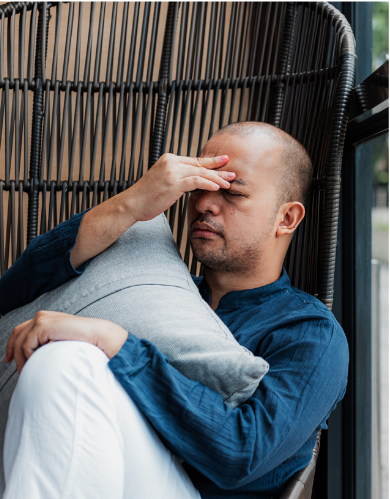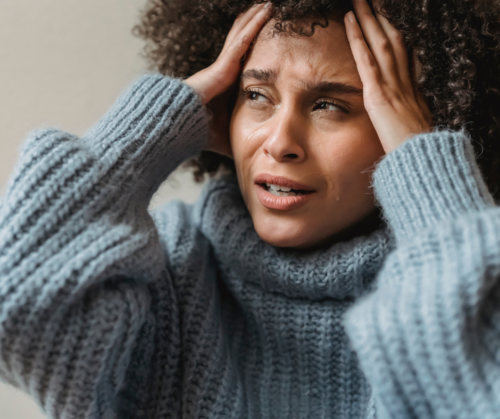Services
Anxiety
 What is Anxiety and How Can We Manage It?
What is Anxiety and How Can We Manage It?
Anxiety is a condition most of us face at some point in our lives. Anxiety is not always clinical. It can be situational, or chronic and persistent. In the fast-paced world we live in, it is common to feel anxious if we believe that we are not measuring up to standards (of ourselves, others, or society as a whole), if we are feeling tired and overwhelmed, or if our stress and worry have escalated. However, persistent or chronic anxiety can prevent us from enjoying life and living up to our full potential. It can create an underlying uneasiness or dissatisfaction.
What is Anxiety?
Generally speaking, when we feel uncertain or fearful regarding a particular occurrence, possible future event(s), or anything related to us, it is known as anxiety. Anxiety can cause racing thoughts, stomach- and headaches, muscle tension, fatigue, poor sleep and irritability. Anxiety can range from mild to severe.
Mild anxiety can often be managed by a person when they take a break from their routine, talk to a friend, get some rest, or engage in self-care. People usually get mildly anxious during stressful times such as preparing for a big deadline, experiencing a major life transition (going away to college or starting a new job) or when meeting someone new or important (going on a date with someone new). Mild anxiety will normally subside when the situation(s) causing the anxious feelings is resolved.
People who experience moderate anxiety usually have recurring symptoms that surface during their daily routine as well. They may be in a state of anxiety or worry most of the time, but many people with moderate anxiety are able to control their symptoms through self-help and lifestyle changes.
Severe anxiety may often lead to a clinical condition that sometimes requires professional help, such as psychotherapy or medication. People with severe anxiety find it extremely difficult to relax and constantly worry about many things at any given time. However, severe anxiety may also be situational and may occur in certain situations (social activities) or in response to experiences (flying) and result in a panic response.
What are the Common Symptoms of Anxiety?
Anxiety manifests in many ways, both physical and emotional, however most types of anxiety have certain common symptoms. The most experienced symptoms of anxiety include:
- Agitation
- Excessive worry
- Fatigue
- Poor concentration
- Irritability
- Fatigue or lethargy
- Restlessness
- Sleep difficulty – unable to sleep restfully, difficulty going to sleep, difficulty staying asleep and/or waking early or multiple times in the night
- Muscle tension or aches
- Panic Attacks
- Fears about things that are inconsequential or harmless
- A tendency to avoid being social
What Causes Anxiety?
A person who experiences anxiety may have it rooted in one or a few of the following causes:
- Hyperactivity in regions of the brain that are concerned with emotions
- Imbalance of brain chemicals Serotonin and Noradrenaline, both of which are hormones that are concerned with determining our mood and emotions
- Singular or multiple traumatic life experiences
- Genetics – if a parent or a close relative in the family has anxiety, you may be predisposed to develop it.
- Long-term chronic illnesses and worries about health/quality of life
- Other psychological conditions such as PTSD, ADHD, and depression are often co-occurring
- Substance misuse/abuse
What are the Different Types of Anxiety?
There are different types of anxiety disorders, common types include the following:
- Panic – People with panic disorder often experience moments of intense anxiety and fear. These feelings peak within minutes or even seconds and symptoms such as shortness of breath, chest pain, and palpitations begin to
 manifest. This is known as a panic attack and the alarming symptoms often cause the person to go to the emergency room as well.
manifest. This is known as a panic attack and the alarming symptoms often cause the person to go to the emergency room as well. - Agoraphobia – People who suffer from this disorder often experience a feeling of helplessness and embarrassment in certain places or during certain situations, such as using public transport or being in large crowds.
- Generalized Anxiety – Manifests in the form of almost constant worry or fear regarding different things which may include health, money, work, family, etc. People experiencing this type of anxiety find it extremely difficult to stop worrying.
- Separation Anxiety – With this anxiety, people are often worried about being separated from their home or from people to whom they have become emotionally attached.
- Social Anxiety – With this type of anxiety, people are at intense unease in social situations. These people find it difficult to talk to people and attend social gatherings. There is often a fear of being scrutinized as well.
- Phobias – A phobia is a fear of a specific object or situation. Individuals with phobias will often react with anxiety and panic when faced with the object of their phobia.
- Obsession and Compulsion – This type of anxiety causes persistent, unwanted, and uncontrollable thoughts (obsession) or repetitive behaviors or acts (compulsions). The repetitive behaviors are performed to get rid of the unwanted thoughts. These obsessions and compulsions are time consuming and interfere with the everyday activities of life.
- Posttraumatic Stress Disorder – Anxiety that occurs after experiencing a traumatic situation, such as disaster, rape, abuse, war, an accident, or any situation that causes you to feel physically or emotionally unsafe. These experiences can occur in childhood or adulthood and may include a re-experiencing of the trauma physically or emotionally, and/or avoiding things related to or reminders of the experience. It can cause feelings of dread, fear, avoidance, irritability, hypervigilance, and distrust.
What Are Effective Methods of Treating Anxiety?
Thankfully, there are quite a few ways to manage anxiety and its symptoms. In a way, we are lucky to be alive in an era where there are numerous strategies for managing anxiety and stores of information available about anxiety and awareness about it. Some of the most common methods include:
Natural Remedies
If the symptoms of anxiety are mild, certain natural remedies can help in soothing the symptoms of anxiety immediately. These remedies may include the following:
- Drinking chamomile tea
- Eating chocolate
- Avoiding caffeine, since it can severely aggravate anxiety
- Getting a massage or going for a spa-day
- Talking to a friend
Lifestyle Changes
For everyday stress and worry, lifestyle changes may be helpful. Anxiety might subside if people went on vacation and took a break from their routine, or if they started eating better or working out. Keep in mind that implementing positive lifestyle changes is amazing but may not help moderate or severe anxiety. If this is what you need, we can help you with tailoring lifestyle changes for you. We also know that lifestyle changes may not be feasible or look the same for everyone, and we will support you in finding what works best for your lifestyle!
Psychotherapy
Perhaps the most sought-after treatment for anxiety is psychotherapy. We have accomplished therapists in our practice who provide psychotherapy in our office and online to help you. Online or virtual therapy may be especially helpful for people with social anxiety, and for people who generally feel anxious outside the comfort of their homes. Our therapists are qualified practitioners who have experience dealing with many complex mental health issues, including anxiety. We can help our clients to bring about changes in their life through supportive and intentional care, including teaching anxiety-reducing techniques such as grounding and breathing exercises, homework, and breaking unhelpful thought and behavior patterns.
Medication
People who have severe anxiety may need the help of a physician or psychiatrist in addition to psychotherapy to help them cope with anxiety. The physician or psychiatrist often prescribes medication that further helps with the management of symptoms of anxiety. Medication can have severe side effects, which should be considered before committing to such a treatment and should be continually monitored. If medication is determined to be needed after meeting with one of our psychotherapists, we can help you locate a psychiatrist to meet your needs.
meeting with one of our psychotherapists, we can help you locate a psychiatrist to meet your needs.
Help for managing anxiety is available, and we can easily help you find the help that you need to manage the symptoms of anxiety effectively. Contact our office today at 678-205-0838 to schedule an appointment or a free 15-minute consultation. We provide therapy for anxiety in our office or online.
.

